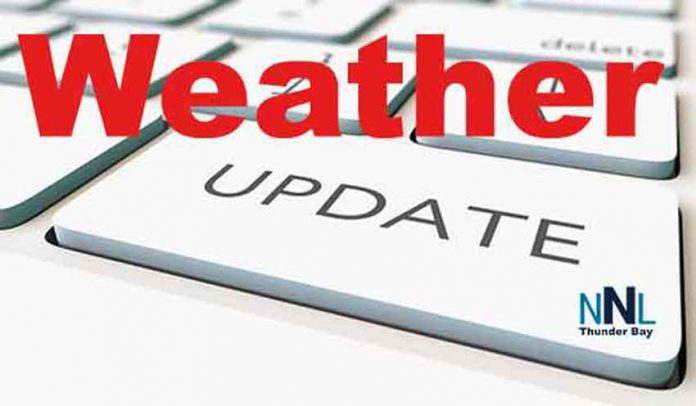THUNDER BAY – WEATHER – First this is day three with no weather alerts or warnings for Northwestern Ontario. That, however, doesn’t mean that the weather isn’t hitting hard in southern Ontario. There are weather alerts and winter storm warnings out from the east side of Lake Superior to all over southern Ontario.
Starting in Thunder Bay, Environment Canada says we can expect skies becoming a mix of sun and cloud this morning. We will see winds of up to 15 km/h. Today’s high minus 9. The wind chill will be minus 25 in the morning and minus 16 in the afternoon.
Heading East? Weather May Change Your Travel Plans
If you are travelling east, chances are the weather is going to impact your plans.
There is a winter storm warning out for the Ottawa region.
Winter storm watch in effect for:
- Ottawa North – Kanata – Orléans
- Ottawa South – Richmond – Metcalfe
Snowfall amounts of 30 to 40 cm and blowing snow Tuesday into Wednesday.
Snow will begin near midday Tuesday. Easterly winds gusting up to 60 km/h will also combine with the freshly fallen snow to create blowing snow. Total snowfall amounts of 30 to 40 cm are likely before the snow tapers off during the day Wednesday.
This snow is associated with a Colorado Low that will cross Southern Ontario Tuesday and Wednesday.
Environment Canada is saying you should avoid travel if possible. Rapidly accumulating snow could make travel difficult over some locations. There may be a significant impact on rush hour traffic in urban areas. If you must travel, keep others informed of your schedule and destination and carry an emergency kit and mobile phone.
Toronto – Extreme Cold Alert
The City of Toronto has enacted an Extreme Cold Alert.
Based on information from Environment Canada, Dr. Eileen de Villa, Toronto’s Medical Officer of Health, has issued an Extreme Cold Weather Alert today for Toronto that will be in effect until further notice. Extreme Cold Weather Alerts are issued when the temperature in the daily forecast is estimated to reach approximately -15 degrees Celsius or colder, or when the wind chill is forecast to reach -20 or colder.
Exposure to cold weather can be harmful to your health. Hypothermia occurs when the body’s core temperature drops below 35 degrees Celsius and can have severe consequences, including organ failure and death. Frostbite can also occur in cold weather when skin freezes and, in severe cases, can lead to amputation when deeper tissues freeze.
Those most at risk of cold-related illness are people experiencing homelessness or those under-housed, those who work outdoors, people with a pre-existing heart condition or respiratory illness, elderly people, infants and young children. People with heart problems can experience worsening of their condition up to several days after cold weather occurs.
Extreme Cold Weather Alerts activate local services that focus on getting and keeping vulnerable residents inside. A warming centre is open at Metro Hall by 7 p.m. the day an alert is called, and remains open continuously until noon on the day an alert is terminated. Other services include notification to community agencies to relax any service restrictions, availability of transit tokens in some drop-ins, and additional overnight street outreach.
Throughout the year, 24-hour respite sites provide meals, places to rest, and service referrals at locations across the city. People can call 311 for locations and to connect to Central Intake for a referral. Homeless Help lists site information at
http://www.toronto.ca/homelesshelp.
The City asks that residents help vulnerable people by calling 311 if there is a need for street outreach assistance. Call 911 if the situation is an emergency.
During an Extreme Cold Weather Alert, members of the public are encouraged to take the following precautions:
• Check the weather report before going outside.
• Dress in layers, making sure your outer layer is windproof, and cover exposed skin.
• Wear a hat, warm mittens or gloves, and warm boots.
• Stay dry. Your risk of hypothermia is much greater if you are wet.
• Choose wool or synthetic fabrics for your clothes instead of cotton, because cotton absorbs and holds moisture, no longer keeping the wearer warm.
• Seek shelter if you normally spend long periods outside. Depending on the wind chill, exposed skin can freeze in minutes.
• Drink warm fluids other than alcohol.
• Warm up by taking regular breaks in heated buildings when enjoying winter activities outside.
• Consider rescheduling outdoor activities, or limiting time outdoors, during colder temperatures, especially if it’s windy.
• Heat your home to at least 21 degrees Celsius if infants or elderly people are present.
• Call or visit vulnerable friends, neighbours and family to ensure they are not experiencing any difficulties related to the weather.







